

ACLU Sues School For Punishing 12-Year-Old Over Facebook Comment. Can a school district punish a student for making derogatory comments about staff members online?
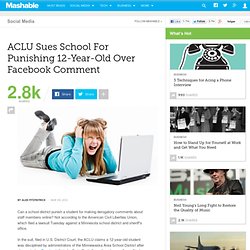
Not according to the American Civil Liberties Union, which filed a lawsuit Tuesday against a Minnesota school district and sheriff's office. In the suit, filed in U.S. Dharun Ravi Gets Off Easy In Rutgers Spying Case: Month In Jail And $10,000 Fine. Jurors' Tweets Upend Trials. Court Orders Man To Delete Revenge Blog Targeted At His Ex. Now Cops Can Search Cellphones Found at Crime Scenes. Police in the U.S. can legally search mobile phones discovered at the scene of a crime, a federal appeals court has ruled.
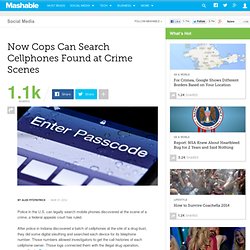
Privacy and Civil Liberties in the Digital Age. Last year, a researcher discovered that iPhones — among the world’s most popular electronic devices — were storing detailed, unencrypted information on their owners’ locations and uploading it to any computer they were connected to.
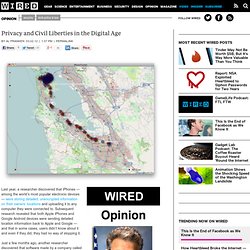
Subsequent research revealed that both Apple iPhones and Google Android devices were sending detailed location information back to Apple and Google — and that in some cases, users didn’t know about it and even if they did, they had no way of stopping it. Just a few months ago, another researcher discovered that software made by a company called Carrier IQ had been secretly installed on millions of smartphones and was tracking consumers’ locations and other private information. In both cases, millions of consumers who were carrying smartphones in their pockets had no idea that their personal information was being collected — and no way of stopping it. FBI cuts back on GPS surveillance after Supreme Court ruling. WASHINGTON – The FBI has begun cutting back GPS surveillance in an array of criminal and intelligence investigations following a Supreme Court ruling last month restricting its use, a federal law enforcement official said.
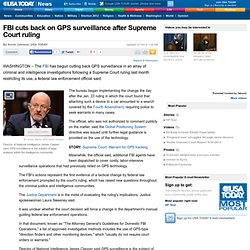
The bureau began implementing the change the day after the Jan. 23 ruling in which the court found that attaching such a device to a car amounted to a search covered by the Fourth Amendment, requiring police to seek warrants in many cases. The official, who was not authorized to comment publicly on the matter, said the Global Positioning System directive was issued until further legal guidance is provided on the use of the technology. STORY: Supreme Court: Warrant for GPS tracking. Privacy laws: Private data, public rules. Ordering defendant to decrypt hard drive did not violate her Fifth Amendment rights. U.S. v.
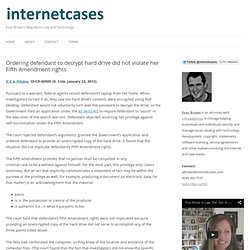
Defendant Ordered to Decrypt Laptop May Have Forgotten Password. A Colorado woman ordered to decrypt her laptop so prosecutors may use the files against her in a criminal case might have forgotten the password, the defendant's attorney said Monday.
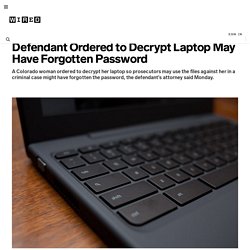
The authorities seized the Toshiba laptop from defendant Ramona Fricosu in 2010 with a court warrant while investigating alleged mortgage fraud. Ruling that the woman's Fifth Amendment rights against compelled self-incrimination would not be breached, U.S. District Judge Robert Blackburn ordered the woman in January to decrypt the laptop. 10-1259 United States v. Jones (01/23/2012) Canada News: Ontario appeal court allows lawsuits for invasion of privacy.
The Ontario Court of Appeal has recognized a right to sue for damages for invasion of personal privacy, which includes snooping through financial, health and employment records, opening mail, reading diaries and intruding into the sexual orientation and practices of another person.

Obama administration says Constitution protects cell phone recordings. The Obama administration has told a federal judge that Baltimore police officers violated the First, Fourth, and Fourteenth Amendments by seizing a man's cell phone and deleting its contents.
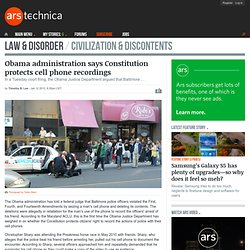
Blogger v. Blogger SoCal Cybersquatting Suit Resolved. In what may be the first lawsuit of its kind, the owners of the site TheLiberalOC.com won a judgment against another blogger who cybersquatted their domain and then posted a series of links to offensive porn sites.
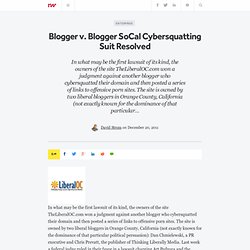
The site is owned by two liberal bloggers in Orange County, California (not exactly known for the dominance of that particular political persuasion): Dan Chmielewski, a PR executive and Chris Prevatt, the publisher of Thinking Liberally Media. Last week a federal judge ruled in their favor in a lawsuit charging Art Pedroza and the Orange Juice Blog with cybersquatting, trademark and copyright infringement. Stalking on Twitter is Protected Speech, U.S. Judge Rules Mashable Stalking on Twitter is Protected Speech, U.S. Judge Rules. You Have A Constitutional Right To Stalk And Harass People On Twitter.
Twitter stalking freedom of speech. Pennsylvania Court Orders Personal Injury Plaintiff to Turn Over Facebook Password to Defendant. Twitter, WikiLeaks and the Troubling Implications For Online Privacy. A U.S.
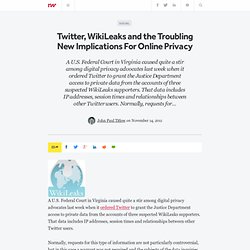
Federal Court in Virginia caused quite a stir among digital privacy advocates last week when it ordered Twitter to grant the Justice Department access to private data from the accounts of three suspected WikiLeaks supporters. That data includes IP addresses, session times and relationships between other Twitter users. Privacy Rights Victory: Court Rules Police Need Warrant to Search Cellphone Records. Worried about the police tracking your whereabouts through your mobile records?
They can't — it's unconstitutional. U.S. law enforcement agents do not have the right to access cellphone location records, a federal court ruled Wednesday. U.S. District Judge Lynn N.